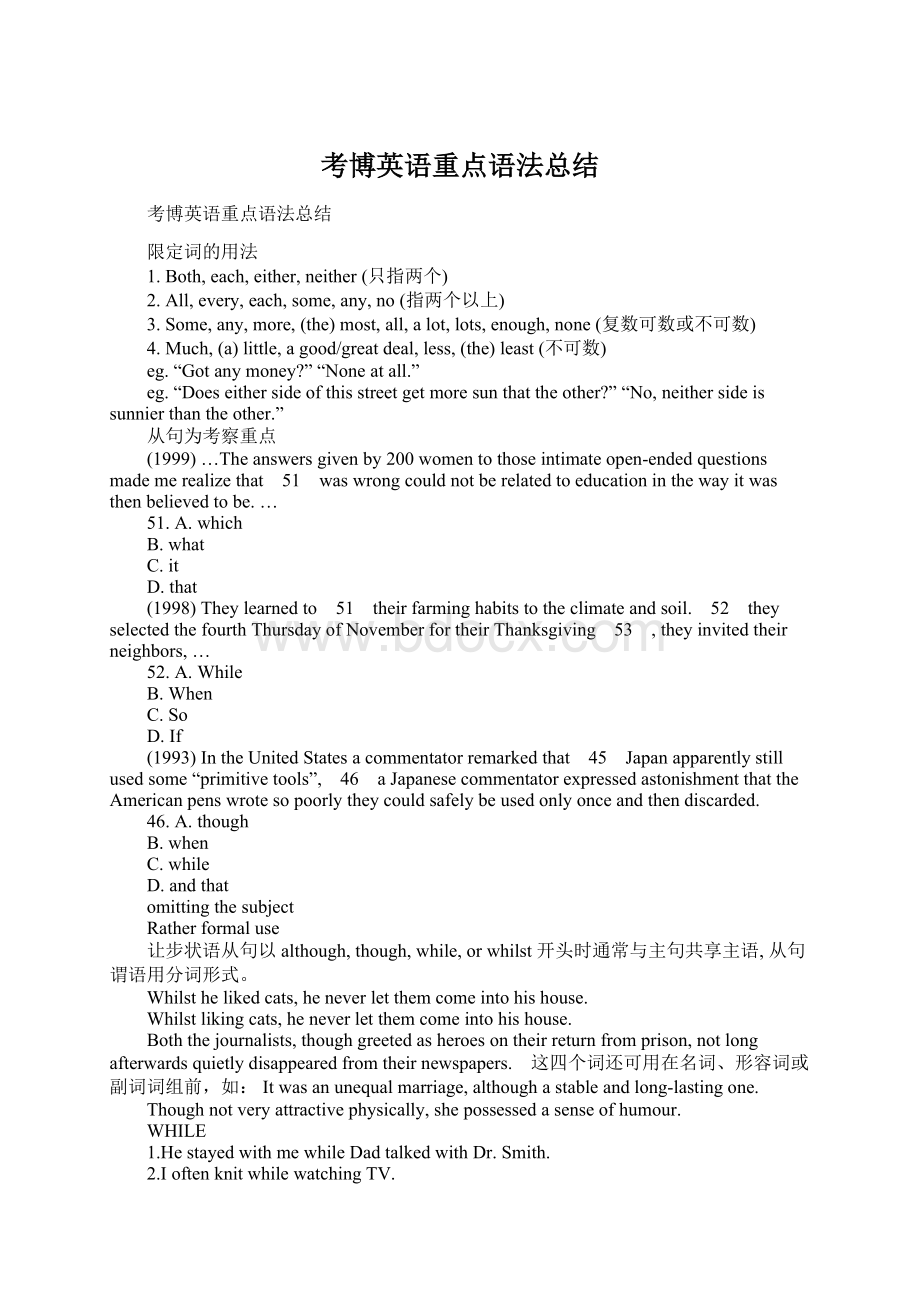考博英语重点语法总结.docx
《考博英语重点语法总结.docx》由会员分享,可在线阅读,更多相关《考博英语重点语法总结.docx(22页珍藏版)》请在冰豆网上搜索。

考博英语重点语法总结
考博英语重点语法总结
限定词的用法
1.Both,each,either,neither(只指两个)
2.All,every,each,some,any,no(指两个以上)
3.Some,any,more,(the)most,all,alot,lots,enough,none(复数可数或不可数)
4.Much,(a)little,agood/greatdeal,less,(the)least(不可数)
eg.“Gotanymoney?
”“Noneatall.”
eg.“Doeseithersideofthisstreetgetmoresunthattheother?
”“No,neithersideissunnierthantheother.”
从句为考察重点
(1999)…Theanswersgivenby200womentothoseintimateopen-endedquestionsmademerealizethat 51 waswrongcouldnotberelatedtoeducationinthewayitwasthenbelievedtobe.…
51.A.which
B.what
C.it
D.that
(1998)Theylearnedto 51 theirfarminghabitstotheclimateandsoil. 52 theyselectedthefourthThursdayofNovemberfortheirThanksgiving 53 ,theyinvitedtheirneighbors,…
52.A.While
B.When
C.So
D.If
(1993)IntheUnitedStatesacommentatorremarkedthat 45 Japanapparentlystillusedsome“primitivetools”, 46 aJapanesecommentatorexpressedastonishmentthattheAmericanpenswrotesopoorlytheycouldsafelybeusedonlyonceandthendiscarded.
46.A.though
B.when
C.while
D.andthat
omittingthesubject
Ratherformaluse
让步状语从句以although,though,while,orwhilst开头时通常与主句共享主语,从句谓语用分词形式。
Whilsthelikedcats,heneverletthemcomeintohishouse.
Whilstlikingcats,heneverletthemcomeintohishouse.
Boththejournalists,thoughgreetedasheroesontheirreturnfromprison,notlongafterwardsquietlydisappearedfromtheirnewspapers. 这四个词还可用在名词、形容词或副词词组前,如:
Itwasanunequalmarriage,althoughastableandlong-lastingone.
Thoughnotveryattractivephysically,shepossessedasenseofhumour.
WHILE
1.HestayedwithmewhileDadtalkedwithDr.Smith.
2.IoftenknitwhilewatchingTV.
3.WhileIhavesomesympathyforthesefellows,Ithinktheywenttoofar.
AND
1.oftenusedtolinkclausesIcameherein1922andIhavelivehereeversince.
2.Whenyouaregivingadviceorawarning,youcanuse“and”tosaywhatwillhappenifsomethingisdone.
Gobytrainandyou’llgettherequicker.
Doasyou’retoldandyou’llbeallright.
WHERE
1.Shewasstandingexactlywhereyouarestandingnow.
2.In1963wemovedtoBoston,wheremygrandparentslived.
3.Thetreatmentwillcontinueuntilthepatientreachesthepointwherehecanwalkcorrectlyandsafely.
4.Youaresayingthateveryoneshouldbeequal,andthisiswhereIdisagree.
5.Now,wherewerewe?
Ohyes,weweretalkingaboutJohn.
6.Whereothersmighthavebeensatisfied,Dawsonhadhigherambitions.(difference)WHICH
(本身无意义,必须接在名词或代词后面)
1.定语从句引导词Didyouseetheletterwhichcametoday?
NowtheyweredrivingbythehouseswhichAndyhaddescribed.
2.分割句子,补充说明Thehouse,whichwascompletedin1856,wasfamousforitshugemarblestaircase.
Hewaseducatedatthelocalgrammarschool,afterwhichhewentontoCambridge.
Shemayhavemissedthetrain,inwhichcaseshewon’tarriveforanotherhour.
THAT 多用于同位语从句和-thing的定语从句中。
WHAT
(有实际意义,可用于宾语从句和主语从句)
1.Nooneknowsexactlywhathappened.
2.Itisnotcleartowhatextenttheseviewswereshared.
3.Icouldgetyouajobhereifthat’swhatyouwant.
4.Whatthatkidneedsissomeloveandaffection.
5.WhatmattersistheBritishpeopleandBritishjobs.
AS
1.比较
Hislastalbumsoldhalfamillioncopiesandwehopethisonewillbejustaspopular./Theywantpeaceasmuchaswedo.
2.作为,正如…We’dbetterleavethingsastheyareuntilthepolicearrive.
David,asyouknow,hasnotbeenwelllately.
3.看作,看待
Theresultoflastweek’selectionwillbeseenasavictory.
4.当…时候=whileorwhen
IsawPeterasIwasgettingoffthebus.
5.原因Asitwasgettinglate,Iturnedaroundtostartforhome.
6.让步=thoughTryasshemight,Suecouldn’tgetthedooropen.
Thebaghasnarrowstraps,soitmaybewornovertheshoulderorcarriedinthehand.
I’dbeintroubleifIleton.SoIkeptmum.
Whenthemealwasfinished,Rachelwashedupandmadecoffee.
IwouldhavelikedtohavelearntFrench,butIwasdenied(=notgiven)theopportunity.
Theopportunitywasdenied(to)meatschool.
Theprestigeisdenied(to)theclassroomteacher.
Theclassroomteacherisdeniedtheprestige.
过去分词与形容词的语义差:
1.Destructive:
causingdamagetopeopleorthings
thedestructivepowerofmodernweapons
Damaged:
beinginabadstate
emotionallydamagedchildren
2.Respected:
admiredbymanybecauseofachievements
He’soneofthemostrespectedmanagersinthegame.
Respectful:
feelingorshowingrespect
Theylistenedinrespectfulsilence.
3.Preferred:
Herownpreferredmethodsofexercisearehikingandlongcyclerides.
Preferable:
Abigearthquakealongwayoffispreferabletoasmalleronenearby.
Preferential:
Bankofficialsdeniedgivingthesenatoranypreferentialtreatment.
4.Unimagined:
Othersseeanewgoldenageofbusinessandtechnologythatwillliftthemarkettounimaginedheights.
Unimaginative:
Thatmeansthetraditionalofficelayoutoflined-upcubiclesandworkstationsisseenasrigidandunimaginative.
5.Loving:
Shewasadevotedwifeandaverylovingmother.
Lovable:
asweetlovablechild
Lovely:
Wehadalovelyholiday.
6.Tolerated:
WhilePatchesaregenerallywelltoleratedtheyarenotalwayssuitableforeveryone.
Tolerant:
treesthataretolerantofsaltseawinds
Tolerable:
Allinall,itwasbettertohaveatolerabletenementthantheidealwhichnoonecouldafford.
虚拟语气
非谓语动词主要包括不定式、动名词和现在分词。
为了区分这三种不同的非谓语动词的用法和含义,我们将分别从三种非谓语动词在句子中做主语、宾语、宾语补足语、定语、状语、表语以及一些特殊结构句型等角度来区分其用法和细微含义。
1.不定式和动名词作主语的区别
(1)动名词作主语通常表示抽象动作;而不定式作主语表示具体动作。
Smokingisprohibited(禁止)here.这里禁止抽烟。
(抽象)
Itisnotverygoodforyoutosmokesomuch.你抽这么多烟对你身体很不好。
(具体)
(2)动名词作主语时,通常用以表示一件已知的事或经验。
不定式短语通常用来表示一件未完成的事或目的。
Climbingmountainsisinteresting.爬山很有趣。
(经验)
Drivingacarduringtherushhouristiring.在高峰时刻开车令人厌烦。
(经验)
(3)不定式做主语,一般用it当形式主语,把作主语的不定式短语后置。
Ittookmeonlyfiveminutestofinishthejob.
2.不定式、动名词和分词作表语的区别
(1)不定式作表语
1)不定式作表语一般表示具体动作,特别是表示将来的动作。
Todotwothingsatatimeistodoneither.--次做两件事等于未做。
WhatIwouldsuggestistostartworkatonce.我的建议是立刻开始干。
2)如果主语是不定式(表示条件),表语也是不定式(表示结果)。
Toseeistobelieve.百闻不如一见。
Toworkmeanstoearnaliving.工作就是为了生活。
3)如果主语是以aim,duty,hope,idea,happiness,job,plan,problem,purpose,thing,wish等为中心的名词,或以what引导的名词性从句,不定式作表语是对主语起补充说明作用。
Hiswishistobuyaluxuriouscarinthenearfuture.他的希望是在不远的将来买一辆豪华轿车。
ThefunctionofLouisSullivan’sarchitecturewastoprovidelargeuninterruptedfloorareasandtoallowamplelightintotheinterior.
Themostimportantthingistonegotiatewiththemaboutthefutureoftheplant.
(2)动名词作表语:
动名词作表语,表示抽象的一般性的行为。
Ourworkisservingthepeople.我们的工作是为人民服务。
Hishobbyiscollectingstamps.他的爱好是集邮。
(注)动名词作表语时与进行时态中的现在分词形式相同,但其所属结构迥异,进行时态说明动作是由主语完成的。
动名词做表语,说明主语的性质或情况。
Peoplecannotbutfeelpuzzled,fortheysimplycannotunderstandhowhecouldhavemadesuchastupidmistake.
HisvictoryinthefinalwasnomoreconvincingthanIhadexpected.
(3)分词作表语
分词做表语有两种情况,一种是现在分词做表语,一种是过去分词做表语,这两者区别是考试中经常考到的地方。
一般来说,表示心理状态的动词如excite,interest等都是及物动词,汉语意思不是“激动”,“高兴”,而是“使激动”、“使高兴”,因而现在分词应该是“令人激动的”、“令人高兴的”,过去分词则是“感到激动的”和“感到高兴的”。
所以,凡表示“令人……的”都是-ing形式,凡是表示“感到……”都用-ed形式。
换句话说,若人对……感兴趣,就是somebodyisinterestedin...,若人/物本身有兴趣时,就是说sb./sth.isinteresting.这类词常见的有:
interesting使人感到高兴--interested感到高兴的
exciting令人激动的--excited感到激动的
delighting令人高兴的--delighted感到高兴的
disappointing令人失望的--disappointed感到失望的
encouraging令人鼓舞的--encouraged感到鼓舞的
pleasing令人愉快的--pleased感到愉快的
puzzling令人费解的--puzzled感到费解的
satisfying令人满意的---satisfied感到满意的
surprising令人惊异的--surprised感到惊异的
worrying令人担心的--worried感到担心的
Travellingisinterestingbuttiring.旅行是有趣的,但是使人疲劳。
Thepupilswillgetconfusediftheyaremadetolearntoomuch.如果要学生学得太多,他们会感到糊涂的。
Theargumentisveryconvincing.他的论点很令人信服。
Theywereveryexcitedatthenews.听到这个消息,他们非常激动。
3.不定式和动名词作宾语的区别
英语中大多数动词既可跟不定式,也可跟动名词作直接宾语,但有些动词要求:
(1)不定式做宾语和宾语补足语
1)下面的动词要求不定式做宾语
attempt企图 enable能够 neglect忽视
afford负担得起 demand要求 long渴望
arrange安排 destine注定 mean意欲,打算
begin开始 expect期望 omit忽略,漏
appear似乎,显得 determine决定 manage设法
cease停止 hate憎恨,厌恶 pretend假装
ask问 dread害怕 need需要
agree同意 desire愿望 love爱
swear宣誓 volunteer志愿 wish希望
bear承受 endeavor努力 offer提供
beg请求 fail不能 plan计划
bother扰乱;烦恼 forget忘记 prefer喜欢,宁愿
care关心,喜欢 happen碰巧 prepare准备
decide决定 learn学习 regret抱歉,遗憾
choose选择 hesitate犹豫 profess表明
claim要求 hope希望 promise承诺,允许
start开始 undertake承接 want想要
consent同意,赞同 intend想要 refuse拒绝
decide决定 learn学习 vow起
contrive设法,图谋 incline有…倾向 propose提议
seek找,寻觅 try试图
2)下面的动词要求不定式做宾补:
动词+宾语+动词不定式
ask要求,邀请 get请,得到 prompt促使
allow允许 forbid禁止 prefer喜欢,宁愿
announce宣布 force强迫 press迫使
bride收买 inspire鼓舞 request请求
assist协助 hate憎恶 pronounce断定,表示
advise劝告 exhort告诫,勉励 pray请求
authorize授权,委托help帮助 recommend劝告,推荐
bear容忍 implore恳求 remind提醒
beg请求 induce引诱 report报告
compel强迫 invite吸引,邀请, summon传唤
command命令 intend想要,企图 show 显示
drive驱赶 mean意欲,打算 train训练
cause引起 instruct指示 require要求
deserve应受 leave使,让 tell告诉
direct指导 like喜欢 tempt劝诱
entitle有资格 order命令 warn告诫
enable使能够 need需要 urge激励,力说
encourage鼓励 oblige不得不 want想要
condemn指责,谴责 lead引起,使得 teach教
entreat恳求 permit允许 wish希望
(2)有少数动词只能用动名词作宾语
acknowledge承认,自认 cease停止 mention说到,讲到
admit承认 tolerate忍受 dislike不喜欢,讨厌
advocate:
提倡,主张 complete完成 dread可怕
appreciate感激,欣赏 confess坦白 endure忍受
avoid避免 contemplate细想 enjoy享有,喜爱
bear忍受 defer拖延 envy嫉妒
can’thelp不禁 delay延迟 escape逃跑,逃避
can’tstand受不了 deny否认 excuse借口
consider考虑 detest嫌恶 fancy幻想,爱好
favor造成,偏爱 mind介意 repent悔悟
figure描绘,计算 miss错过 resent